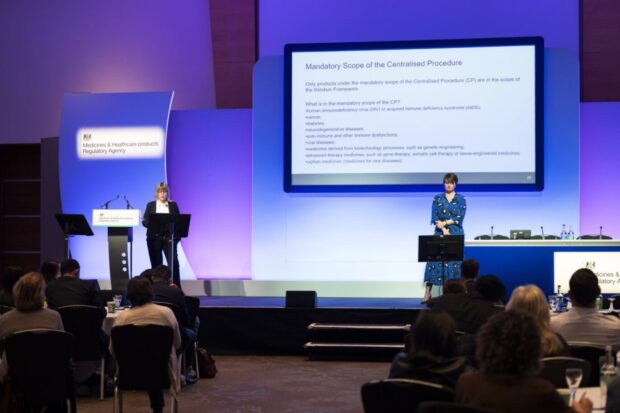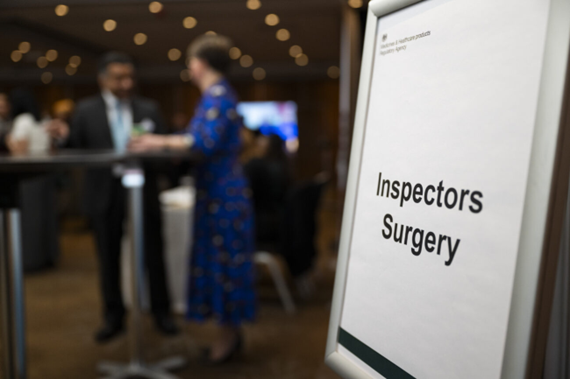The world of GPvP is highly regulated, but the 2024 GPvP symposium showcased how regulation, collaboration and innovation can work together to enhance compliance, provide opportunities for better ways of working, and improve patient lives.
The Symposium welcomed over five hundred delegates to a hybrid event which saw regulators, including inspectors and assessors from the MHRA, share common compliance issues, future regulatory direction and innovative methods to aid compliance.
Keynote speaker Mercy Jeyasingham, MHRA Non-Executive Director and Chair of the Patient Safety and Engagement Committee, set the tone with an inspiring speech reflecting on the common goal shared by delegates and MHRA: protecting public health.

Innovation
Examples of innovation peppered the morning sessions, from a talk from the Head of Compliance Team 1, Stephen Vinter on ongoing strategy work within the Compliance Teams which is exploring new avenues to drive the Compliance Teams and the conduct of inspections forward, to a pilot project, discussed by GPvP Inspectors, Zoe Hamill and Anastasia Daskajiannis St John on Remote Compliance Assessments, aimed at reducing the burden of re-inspections.
Mick Foy, Director of Delivery at the MHRA introduced delegates to the MHRA’s RegulatoryConnect project—a far-reaching data-driven transformation of regulatory systems which will impact on how data is submitted by MAHs as well as how inspections are planned and recorded.
Look out for more information from the MHRA as these projects progress.
The audience was treated to a discussion on the use of artificial intelligence (AI) in pharmacovigilance, an area of intense interest since the launch of successful large language models. A panel of guests from MHRA and Health Canada gave perspectives on AI regulation both in pharmacovigilance and other more developed areas such as medical devices guidance.
Delegates were live-polled on the use of AI within their organisations, with fascinating results .
- 27% of respondents’ organisations were currently using AI or machine learning (ML) technologies for the conduct of pharmacovigilance tasks.
- 44% of respondents’ organisations were currently exploring or developing AI or machine learning technologies for the conduct of pharmacovigilance tasks.
- Of the respondents who were using or exploring AI or ML technologies, 43% doing this for the collection and collation of adverse drug reactions, including medical information and product quality.
Despite this, inspectors had yet to inspect an AI system within pharmacovigilance.

Compliance
The agenda included the ever-popular inspection metrics session. Anastasia Daskajiannis St John, GPvP Inspector, began the session with insights into recent inspection outcomes, including critical findings and their drivers, and Sophie Radicke, Head of GPvP and Senior GPvP Inspector, finished the session with a deep dive into inspections unique to the MHRA’s risk-based inspection programme: non-interventional post-authorisation safety study (NI-PASS) and additional risk minimisation measures (aRMM) inspection arms.
In keeping with this theme, experienced MHRA Assessor, Shahin Kauser, brought the audience up to speed on an assessor’s expectations of NI-PASS with examples, insights and watch-points from real submissions.
The day also included case studies on critical findings, a keen topic of interest for delegates. This year, case studies focused on the generics sector and were presented by Silvia Danesi and Zoe Hamill, GPvP Inspectors.
The first of these highlighted the potential for negative impacts on patient safety following a dispute between an MAH and its outsourcing partner. Key messages included the importance of implementing measures for the business continuity of critical pharmacovigilance processes.
The second case study brought the audience into the heart of an inspection and highlighted the importance of maintaining UK-licensed product information in line with EMA-published safety information including PRAC, PSUSA and Referral outcomes for the safety of patients.

Regulatory updates
Towards the end of the day regulatory updates impacting pharmacovigilance, including the much-awaited Windsor Framework, were shared by Steph Millican, Head of Immunulogy, Biocompatibility and Non-Clinical and Claire Longman, Expert GPvP Inspector.
Claire began by introducing a recent change in how to submit the summary of pharmacovigilance systems (SPS)—read the blog post Guidance updates on to how to notify the MHRA of changes to the PV System for details.
Next, key concepts and direction of travel for point of care and modular manufacture were shared, which will impact on the traditional model of the collection of safety information. This was followed by a summary of the international recognition procedure (IRP), and more information on IRP can be found here.

Both Claire and Steph discussed the Windsor Framework, highlighting products which were within and outside of its scope and how the UK regulatory framework would look following the implementation on 01 January 2025. Although a work-in-progress, the speakers emphasized opportunities for information exchange during ongoing trade association discussions, and the upcoming release of guidance to aid understanding of this evolving space. In the meantime, further details can be found in existing guidance published by the MHRA on UK-wide licensing for human medicines.
Collaboration and networking

For in-person delegates, there were welcome refreshments, an opportunity to network with like-minded professionals, a recruitment stand, and an exclusive chance to speak directly with inspectors during the inspectors’ surgeries. Those who missed out on the recruitment stand but are interested in a diverse and varied career at the MHRA can read this blog post to meet some of the inspectors.
Two panel sessions were held throughout the day, with the last being a marathon of questions and answers in a race to answer as many of the two-hundred-plus questions received from delegates. If your question wasn’t answered during the event, subscribe to our blog where we aim to publish answers to popular questions and topics. Alternatively, submit your question to gpvpinspectors@mhra.gov.uk.
Summary
All in all, the event highlighted the continued challenges faced in GPvP by both industry and regulators but gave insights into how improvements to pharmacovigilance processes and systems can be made, pitfalls to be aware of and new regulations coming down the line. The high-quality content, questions and engagement demonstrated the passion of all parties to get pharmacovigilance right.
Thank you to everyone who attended, whether virtual or in-person, for helping to make the event another successful one, and for sharing feedback. We look forward to welcoming you again next time.

“Thank you for another great PV symposium”
“Great presentations and topics”
“Very useful event and good to meet the PV Inspection team even if it was virtually”

